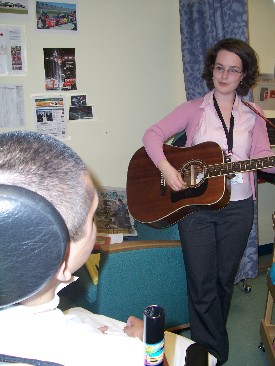The benefits of music lie in the development of music therapy, an alternative medicine that uses music to gain both physical and emotional healing and body wellness. Music therapy may involve either making music or listening to a wide variety of music types. Research has shown that listening to music may indeed have some beneficial effects on both body and mind. Certain rhythms and tones can help to excite or relax the body and mind. Music therapy is often used to relive excessive stress with interesting results.

In a study conducted on pregnant women, music was shown to reduce stress, anxiety and depression. Researchers at the College of Nursing at Kaohsiung Medical University in Taiwan examined 236 pregnant women who listened to 30 minutes of music a day for two weeks. The results, published in the Journal of Clinical Nursing, showed a significant drop in stress, anxiety and depression levels in the participants.
Additionally, music may also contribute to heart and vascular health. According to research done by Michael Miller MD, director of preventative cardiology at the University of Maryland, robust music may do more than mental excitement. His study looked at ten participants who choose music that they made them feel particularly blissful. While listening to the music, the participant was examined with an ultrasound to measure blood vessel dilation. In response to the joyful music, blood vessels dilated by 26%, which is similar to responses following aerobic exercise. This is an important find, because it leads to another avenue of boosting heart health, with fairly inexpensive means.
Although many participants felt happy when listening to country music, but anxious when listening to heavy metal, Miller reminds us that it is the participant’s response to the music that initiates the response. Music is merely the tool of delivery, and it is the joy that is caused by the music that helps contribute to vascular health.
Upon examination, it really does seem that the miraculous effects of music may indeed be all in the mind. In another study, conducted on recent stroke patients, listening to music was evaluated against recovery time. Neuroscientists from the University of Helsinki, Finland partnered with music therapists and found that stroke patients, who listened to favorite music during initial recovery, significantly enhanced their cognitive function and quickened the overall recovery time.
"We found that three months after the stroke, verbal memory improved from the first week post-stroke by 60% in music listeners, by 18% in audio-book listeners, and by 29% in non-listeners,” says Teppo Sarkamo, a doctoral student involved with the study. "Similarly, focused attention -- the ability to control and perform mental operations and resolve conflicts among responses -- improved by 17% in music listeners, but no improvement was observed in audio-book listeners and non-listeners."Not only did the music show to help cognitive function after stroke, but an overall better mood was also seen in the participants of the study.
In short, it seems that music does in fact have a tangible affect upon our mental and physical states. But how far does that go? Researchers and physicians alike urge caution when putting all our faith in the power of music. For the most part, the findings of the above studies are unsurprising. It seems that we already know that music can help relax or excite us, can help boost our energy at the gym, or gear us up for doing chores, and also calm us down after a difficult day. It also seems natural that doing something that you enjoy, like listening to favorite music would help your body recovery from injury merely for the purpose that you feel good, and your body responds in kind. In a certain sense, we have been doing this for decades, innately we know that exposing ourselves to certain stimuli will create some foreseen effects, and we pick accordingly. Communication theorists call this response mood management, in which we subconsciously and consciously manage our moods through outside stimuli, often media. If we are feeling stressed or anxious, we pick soothing media, like calm music or a mellowing TV show or movie. If we feel depressed or lethargic, we might listen to some upbeat music, pick an action movie or watch Jack Bauer kill some terrorists on 24. Therefore when connections to our mental and physical states occur due to music, this seems to make sense.

But how far can music heal you? Last week, the Lake Hospital system announced that they received a 60,000 dollar grant to study effects of music on patients with diabetes. Their study will examine 200-300 participants in a three year study starting this April. The study aims to compare the effects of diabetes self-management training, music-assisted relaxation and imagery administered via compact disc recording; and additional music therapy. Blood pressure, blood sugar, body mass index, anxiety and stress levels will be measured regularly in the participants. Although we do know that music can help vasculature, mental states and mood, there is little to no evidence to suggest that music therapy will help the outcome of diabetes. However, the Lake Hospital System is aiming for a higher degree of self-management ability for its participants, which can curb negative consequences of diabetes. How they facilitate this through the help of music is unknown, and this study seems to be a shot in the dark.
Perhaps there will be some miraculous benefit for patients suffering from diabetes to engage in extreme music therapy, however previous research indicates that it is not the music itself that determines the benefits, but the emotional responses to the music that is the key. Even though there is little evidence to support that music will help diabetes, perhaps the mysterious Beatles Chord will urge our pancreatic islet cells to start producing insulin, but most likely, that 600,000 dollars would be better spent elsewhere.
References:
Health Reduces Pregnancy Stress, Web MD
Joyful Music Helps the Heart, Web MD
Music Mends Mind After Stroke, Web MD





Comments